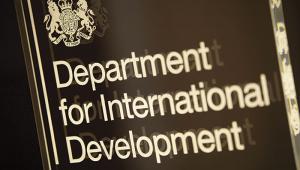By Nick Mann | 1 October 2012
The Independent Commission for Aid Impact has been winning plaudits for its work scrutinising the UK’s spending on overseas development. It could lead to a more positive evaluation of the aid budget.
The Independent Commission for Aid Impact was hailed as part of a ‘radical new agenda of transparency and accountability’ for UK aid spending when it was launched in 2011 by the then International Development Secretary Andrew Mitchell.
The watchdog has the task of ensuring that the Department for International Development’s ring-fenced overseas aid budget is spent effectively and obtains value for money. It has been very busy since its launch, delivering 14 reports examining the department’s work.
The breadth and depth of the ICAI’s work is there for all to see, from reporting on obvious topics, such as the DFID’s approach to tackling corruption in the countries it channels aid to, through to more niche areas, such as the climate change programme in Bangladesh.
The question, however, is whether all these reports are having any impact on the department’s approach to spending, an issue likely to be close to the heart of the new International Development Secretary Justine Greening.
Unsurprisingly, ICAI chief commissioner Graham Ward is in no doubt the commission has made a difference. ‘We’ve introduced a new style of scrutiny into the development world, an approach that assesses effectiveness and value for money and looks at the two things together,’ he tells Public Finance.
‘What we wanted to do was publish reports that were credible and objective and firmly based on evidence and which then made a positive difference to the overseas development aid programme. I believe those things have been achieved.’
The bare facts certainly back up Ward’s assumptions: before the publication of its latest report, the ICAI had made 57 recommendations for the DFID to take action. Of these, the department has accepted 48 in totality, partially accepted seven, and rejected just two.
Ward describes this as a ‘fairly decent run rate’, and says that the ICAI has also had a positive response to its work from the Commons’ international development committee, which it reports to.
In particular, he highlights the impact of its anti-corruption report, which included a call for the DFID to give a senior official responsibility for implementing the department’s attempts to make sure corruption was tackled.
‘Mark Bowman was brought onto the DFID board and has been working hard in terms of implementing things ever since that happened,’ he says.
A spokesman for the DFID says the commission’s reports ‘have helped crystallise views and galvanise action in several areas’. Among the 112 actions the department had committed to as of the end of August, he highlights in particular improvements to its compliance systems and strengthening guidance.
‘Improvements have resulted from all the commission’s recommendations which the DFID has so far acted on,’ he adds.
The chair of the international development committee, Liberal Democrat MP Malcolm Bruce, endorses Ward’s assertion and tells PF that the commission is ‘making a difference’. He says that the ICAI has ‘added a dimension’ to the scrutiny of the department’s work that wasn’t there before.
He notes, however, that the early stage of its existence has partially been a ‘bedding in’ process, and that its impact could increase as the consultants and commissioners that make up the ICAI develop their expertise.
‘The commission’s observations have been embarrassing [to DFID] on occasions and it may get more so because when the ICAI team get deployed again and again, over time they will develop a development perspective.’
Embarrassing the department is sometimes a good thing, Bruce says. ‘The department is spending a lot of money in difficult situations and it’d be good to show things up,’ he adds.
The wider aid community has also welcomed the ICAI’s insights into the DFID’s work. A spokesman for Oxfam tells PF that the commission has done ‘a good job of painting a picture of how UK aid makes a difference and where things can be done to improve it’.
Lawrence Haddad, the director of the Institute of Development Studies think-tank at the University of Sussex, largely shares those sentiments. As well as giving a ‘better sense’ of the DFID’s work, he says the commission’s ‘mere existence has calmed a lot of aid sceptics’ worries about value-for-money’.
‘It’s really important for aid sceptics to know there’s an aid body to hold the DFID to account,’ he explains.
Where Haddad does think more work is needed is for the ICAI to make clear why it’s chosen particular topics and programmes for evaluation and to take a high-level approach to its work. The 14 reports delivered to date are ‘all over the place’ he says. ‘I’d rather they concentrate on a particular issue that crosses across regions, such as security.’
While the ICAI has a budget to continue its work until the end of the current parliament in 2015 at least, its work will be subject to a mid-term review by the Cabinet Office in 2013. The DFID says this will be a ‘time to take stock, and look at the future of ICAI post-2015’.
Details of what this review could entail are yet to be made available, but Haddad says evaluating the commission’s work will be important ‘politically and substantively’. ‘Whether it’s been delivering as much value for its budget as it should I have no idea,’ he adds.
The commission’s work is also likely to be put under the spotlight by the recent change at the helm of the DFID.
Ward is unwilling to be drawn on what Greening’s view of the ICAI might be but notes that ‘clearly we’d hope for continued support for the programme’.
Bruce also expects relatively little upheaval from the change at the top of the DFID. ‘Andrew Mitchell set it up but I have no reason to believe the present secretary of state would want to change it and she has very little scope to do so because it’s up and running,’ he says.
What Greening’s appointment has done is renew focus on how the DFID spends its ring-fenced budget. Within two weeks of her joining the department, she ordered an investigation into the money paid by the DFID to outside bodies, and Haddad believes the ministerial change will offer a fresh opportunity for ‘aid sceptics’ to make their case.
‘It’s even more relevant now with the change of the secretary of state,’ he says. ‘We’re already seeing them saying “cut the aid budget” and are going to see more of them come out.’
This article first appeared in the October issue of Public Finance magazine













